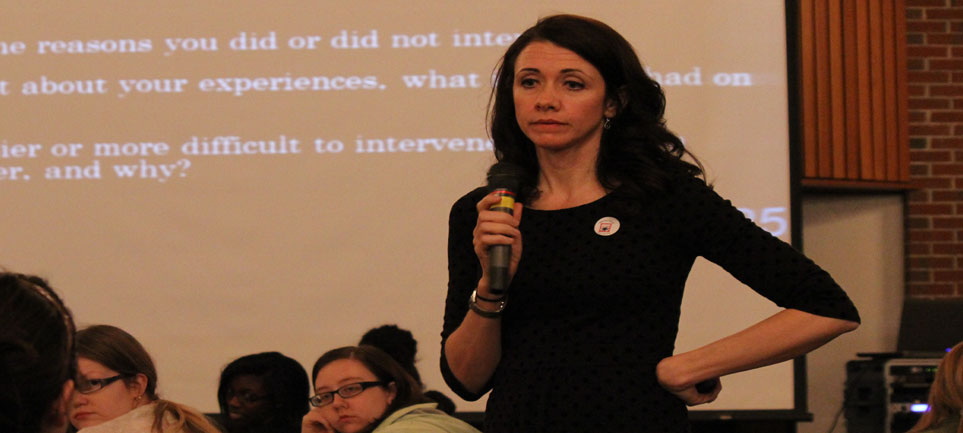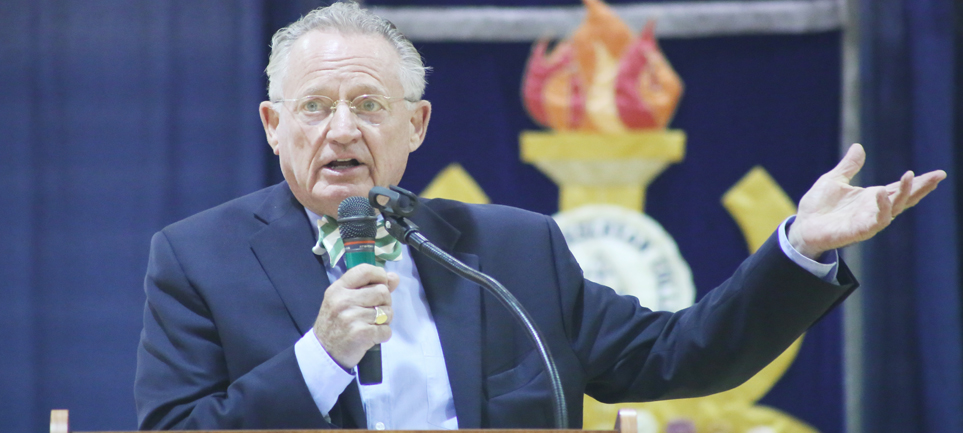VWC continued its string of sexual assault forums when the University of Richmond’s Kerry Albright Fankhauser visited the campus on March 30.
“If you know someone who has been a victim of sexual assault, please stand up,” said Kerry Albright Fankhauser, an asssociate dean and a deputy Title IX coordinator at the University of Richmond.
Fankhauser addressed an audience composed almost entirely of female VWC students in Boyd Dining Hall on the evening of March 30. According to McCarren Caputa, associate dean of students for residence life and one of VWC’s Deputy Title IX directors, the audience numbered more than 175.
About three-fourths of those in attendance rose to their feet. The response illustrated the relevance of Fankhauser’s presentation, aimed primarily at female students, on sexual assault. The gathering was the latest installment of the college’s continuing effort to educate students about Title IX and sexual assault.
Barry Olson, vice provost for business administration at North Carolina State University, gave a speech on Feb. 19 at a similar VWC forum on sexual assault, geared toward male students. According to a campus-wide email from VWC President William Greer, research has shown programs on sexual assault are more effective using a gender-specific approach.
Fankhauser’s presentation was meant to give students tools to recognize, deal with and ideally prevent sexual assault.
In her position at the University of Richmond, Fankhauser handles sexual assault cases on a weekly basis. These may include such offenses as stalking, relationship violence, harassment or rape.
“A lot of these cases come down to consent,” she said. To be consensual, a sex act must be mutually, unambiguously agreed upon by those involved, which is impossible if force is involved or if a person is incapacitated. In fact, alcohol is “the number-one tool” used by the 4 to 6 percent of college men who commit 95 percent of sexual assaults on college campuses, she said.

Caputa said the next day that “hookup culture” can also affect consent.
“They’re not having conversations about anything. They don’t know each other’s last names. They don’t know each other’s major. So how can they have a conversation that starts with ‘Would you like to have sex?’” Caputa said.
Caputa said that helping students learn what healthy relationships look like is key. Often, according to Fankhauser, behaviors in abusive relationships mirror those in healthy ones. An outsider can have difficulty gauging what is really going on.
Fankhauser gave three “reminders” of what to do if, as a bystander, you notice something that could be dangerous, such as an intoxicated person being led away from a party. First, take a second look. Then, “check in”: talk to one or more of the people involved to better discern what is happening. Third, keep in mind the question, “What if it were someone I loved?”
“My hope,” Fankhauser said, “is that everyone will just think twice as they move through their daily life on campus. First just notice things, and then get involved.”
With participation from the audience, she identified several obstacles that keep bystanders from intervening, and also identified multiple effective ways for a bystander to get involved without self-endangerment.
VWC’s two Deputy Title IX Directors, Caputa and Jason Seward, are trained facilitators for Bringing in the Bystander, a national, research-based organization to give people the skills to prevent sexual assault by intervening for their peers. Caputa said they hope to work with campus group Phenomenal Woman on bystander intervention training. Then, next fall, Phenomenal Woman could give presentations to groups on campus, on a peer-to-peer level.
President of Phenomenal Woman, senior Sarah Nwokorie, spoke at the end of Fankhauser’s presentation. She said that victims of sexual assault should know that the Title IX system in place at VWC works.
“You are going to get justice,” Nwokorie said,” if you use the process.”
Furthermore, Nwokorie said that VWC will have a “Take Back the Night” walk around campus starting at 8 p.m. on Tuesday, April 21. The event’s purpose, she said, is “to recognize that people have experienced this, and to show that we care and that we’ll be part of the change.” She asked students to come and to invite their friends—and not just the female ones.
“We want guys!” Nwokorie said.
Now that men and women at VWC have each had a presentation on sexual assault given to them, many on campus say they would like a mixed meeting on the topic. “I think the males need the female perspective and the females need the male perspective, because that’s how you grow,” junior Collette Vauthier said. Caputa said she is hopeful such a meeting will be held this fall.
Sarah Antozzi


